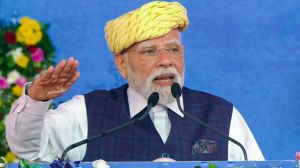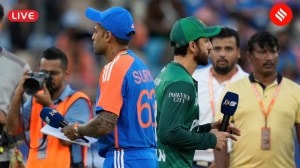Stay updated with the latest - Click here to follow us on Instagram
Supreme Court asks own: Are we being flexible with law in granting divorce?
Under Article 142, the Supreme Court has the authority to issue any order “for doing complete justice”.
 For many years now, the Supreme Court, exercising its power under Article 142 of the Constitution, has been granting divorce even while the Hindu Marriage Act makes it mandatory for couples to stay apart for at least 18 months before parting with mutual consent.
For many years now, the Supreme Court, exercising its power under Article 142 of the Constitution, has been granting divorce even while the Hindu Marriage Act makes it mandatory for couples to stay apart for at least 18 months before parting with mutual consent.
A Supreme Court bench has decided to examine whether the top court should be granting divorce on the ground of irretrievable breakdown of marriage and without the mandatory 18-month period of separation.
For many years now, the Supreme Court, exercising its power under Article 142 of the Constitution, has been granting divorce even while the Hindu Marriage Act makes it mandatory for couples to stay apart for at least 18 months before parting with mutual consent.
While the government has informed the top court that there is no proposal to incorporate irretrievable breakdown of marriage as one of the conditions for grant of divorce in the Act, a bench of Justices Ranjan Gogoi and N V Ramana has decided to examine whether judges should be overriding the legislative will.
[related-post]
Under Article 142, the Supreme Court has the authority to issue any order “for doing complete justice”. Using this, the court has granted divorce in several cases, dispensing with the six-month waiting period after a judicial separation of one year — that makes it 18 months under Section 13B of the Act.
Adjudicating a clutch of petitions wherein couples wanted the waiting period to be curtailed since there was irretrievable breakdown of marriage, Justices Gogoi and Ramana wondered if they should exercise such power when the Act provides otherwise. They sought the views of Attorney General Mukul Rohatgi who said the legislature was not contemplating irretrievable breakdown of marriage as a ground for divorce.
On whether the court should dispense with the waiting period, Rohatgi said there have been dissenting views of different benches of the apex court between 1996 and 2010. Some judges were of the opinion that the six-month notice period should be relaxed while others said if legislature had a specific provision, couples should be sent to family courts for getting divorce as per law, he said.
Rohatgi said it may be proper to let a constitution bench decide whether divorce can at all be granted on the ground of irretrievable breakdown of marriage and also if the waiting period could be dispensed with.
The bench, however, noted that referring the issue to a constitution bench may not provide a solution since a decision by it would take long while such cases would keep coming up in quest of speedy disposal. It observed there could be “numerous peculiar situations” in a marriage and when “it is almost impossible to understand human beings, devising a thumb rule to grant divorce in such cases is very difficult”.
The bench appointed four amicus in the case — senior advocates V Giri, Dushyant Dave, Indira Jaising and Meenakshi Arora — and sought their assistance in finding legal answers to two questions it framed.
It sought to know whether the top court should exercise its power under Article 142 at all or whether it could be done on a case-to-case basis. Further, what could be the broad parameters for exercise of such power to dissolve a marriage without referring a couple to a family court to wait for the mandatory period, it said. The bench will hear the case next in August.







